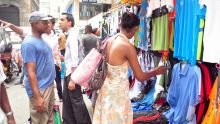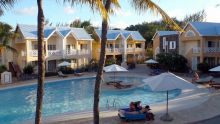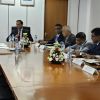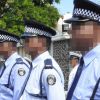
10,330 students have been admitted in primary schools (Grade 1) and 14,442 students have been admitted in secondary schools (Grade 7) in the Republic of Mauritius on Friday 10th January. The grand start of the academic year 2020 will take place on Monday 13th January in all pre-primary, primary, secondary and tertiary institutions of our Republic. In an exclusive interview with News on Sunday, the Minister of Education, Leela Devi-Dookun Luchoomun, revealed the priorities of the Ministry, the challenges ahead and how the Ministry plans to address several issues in the education sector as well.
Publicité
What are the Ministry’s priorities for the new Academic Year 2020?
The Ministry has several objectives for the year 2020. One major focus will be on the pre-primary level. As we all know, a child’s upbringing is crucial before the age of 6. We plan to review and restructure the pre-primary sector, ensure that we are offering all means in order to allow all our children to grow and develop a solid foundation for their future. We have already reviews the curriculum and we will be soon coming with the Continuous Professional Development Programme for all those working in this sector, namely teachers, school managers, coordinating officers and monitoring officers. We are also reviewing the Early Childhood Care and Education Authority (ECCEA) as well as the zoning system for pre-primary. There are some regions where there are not enough pre-primary schools to absorb the demand, namely in the south and west. We thus need to assure that we have pre-primary institutions all around the island. I had a meeting with the director of the ECCEA and we have already established a work plan and several strategies.
Another objective this year will be the technical education. This year we will come forward with a new legislation namely the ‘Institute for Technical Education’. We will thus review everything related to technical education. We need to ensure that the student, who passes Grade 9 and opts for a technical training, receives a quality and holistic education. Regarding the tertiary sector, we have a variety of courses and educational programme as diverse as in foreign countries, given the several collaborations that we have with foreign universities such as Australia, UK, France, South Africa and others. The board of the Quality Assurance Authority has already been established and we will soon come forward with the establishment of the board of the Higher Education Commission. I trust that we are ready to take on the education hub. It is important to highlight that with free tertiary education, we have had an additional of 3,000 admissions in our universities and we have lots of foreign students in our island as well.
There is nothing different comparing the PSAC results to what was happening before."
The passing rate for PSAC has gone down this year. Why is that according to you and what are the plans to tackle this?
I have done an analysis on the evolution of the results for the last ten years. I have seen that it is always down or up by 1 or 2 percent. There is nothing different comparing the PSAC results to what was happening before. The only thing I believe is that we must change our way to view an assessment. The young children who come out of our education system are capable of expressing themselves, communicate, handle ICT devices, do sports; they come out with several skills. We have the teacher, the support teacher, the holistic educator. They are all there to work for the holistic education of our children. I trust that many things are already being done in our schools. We will see the results not immediately but in the coming months and years. The students who have sat for the PSAC recently have not benefitted from the additional support. On other hand, those who will sit for the PSAC examinations in two to three years time have received the additional support. So I trust that our students will do better. I must highlight that we have introduced in collaboration with SeDEC (Service Diocésain de l’Education catholique) the Emotional and Social Well Being Programme as well as the ‘Leader in Me’ programme which will be extended to the secondary level.
I trust that a vital skill that our students must develop as well is team work and team spirit."
What can you tell us about the renovation works of the 12 colleges which will be transformed into academies in 2021?
We have a unit at the Ministry which handles all infrastructural works. I must say that all the works have already started in the 12 colleges. However the majority of the work is about ensuring that all colleges have the necessary labs, toilets, and others. I believe that by the time that colleges need to become operational in 2021, they will be all ready to welcome the students. The transformation of the college is also about the atmosphere, the governance and the autonomy of the school. We have established a task force which is doing follow up works with the different components of the education reform regarding academies.
The fact that we have an aging population and low fertility rate, do you believe that it would be wise to reduce the class size at secondary level, where we still have 40 pupils in a class?
There is in fact a decrease in the number of student admission, whether at primary and secondary level which is felt in both the public and private schools. We have some primary schools which have only 20 students in class for Grade 1. I definitely trust that the performance is better when there are less students in a class. When it comes to private schools that feel that they will have to close their doors due to this issue, I believe that they should find other solutions in order to turn the situation in their favour and that of students. On the other hand, in schools in some regions where the demand for the secondary school is high, we cannot do the contrary. We will however definitely go through a period of transition and we will have less and less students in our classes in both public and private institutions.
Each year, the number of students opting for science as from Grade 10 and up (SC/HSC) is going down. How do you plan to give more value to and promote science subjects?
The Ministry now has a branch dedicated to Science and Technology. We will soon set up a unit to ensure that students develop an interest for science subjects. We have noted that since the introduction of the Alternative to Practical Papers, students have less exposure to practical works and that very often it is only about demonstrations. We are working with the Mauritius Examination Syndicate (MES) to re-introduce in the years to come practical examinations for science subjects. Of course we will have to prepare our students for these changes.
The practical examinations will take place in class as from primary level and as from Grade 7 at secondary level. Teachers will have to ensure that students are being offered hands-on experiences at school. I must highlight that with the Rajiv Gandhi Science Centre, we have done several projects and workshops with students of pre-primary level. We have even done a project with their collaboration to initiate mothers to science so as to ensure that they will encourage their children to develop their curiosity and interest for science. With the online courses that we will have for students of Grade 7 to 9 next year, we will be able to introduce some programs to develop a keen interest in our students. I trust that a vital skill that our students must develop as well is team work and team spirit. We must teach them this skill as from an early age. We have the responsibility to teach them that people move forward with the help of others instead of being on our own.

Notre service WhatsApp. Vous êtes témoins d`un événement d`actualité ou d`une scène insolite? Envoyez-nous vos photos ou vidéos sur le 5 259 82 00 !

















![[Municipales 2025 PART 2] Cap sur BB/RH : vos questions, leurs réponses](https://defimedia.info/sites/default/files/styles/square_thumbnail/public/eok.00_00_20_14.still001_0.jpg?itok=2c2dhAXv)
![[Vidéo] Renganaden Padayachy interrogé par l’Anti Money Laundering Unit](https://defimedia.info/sites/default/files/styles/square_thumbnail/public/img-20250416-wa0028.jpg?itok=_0seoILT)
![[Municipales 2025 PART 1] Cap sur BB/RH : vos questions, leurs réponses](https://defimedia.info/sites/default/files/styles/square_thumbnail/public/eok.00_00_20_14.still001.jpg?itok=EAO5XCE_)

